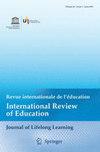喀麦隆的辍学率及其决定因素
IF 1.6
Q1 EDUCATION & EDUCATIONAL RESEARCH
引用次数: 0
摘要
本文提出的研究考察了小学辍学的决定因素,同时强调了喀麦隆家庭特征的作用。数据来自2014年进行的喀麦隆第四次家庭调查(ECAM 4)。作者使用扩展生产函数来估计一个logit模型,该模型提出了解释变量的边际效应。结果表明,为满足家庭需要而必须工作的儿童,以及户主为农民或非正规部门工人的儿童,辍学的可能性较高,而教科书和其他学习用品的可获得性与辍学的可能性较低有关。本文章由计算机程序翻译,如有差异,请以英文原文为准。
School dropout in Cameroon and its determinants
The study presented here examines the determinants of primary school dropout while highlighting the role of household characteristics in Cameroon. Data were drawn from the fourth Cameroonian household survey conducted in 2014 (ECAM 4). The author uses an extended production function to estimate a logit model that puts forward the marginal effects of the explanatory variables. The results show that the probability of dropping out of school is higher for children who have to work in order to meet household needs, and when the head of the household is a farmer or a worker in the informal sector, while the availability of textbooks and other school supplies is associated with a lower probability of dropout.
求助全文
通过发布文献求助,成功后即可免费获取论文全文。
去求助
来源期刊

INTERNATIONAL REVIEW OF EDUCATION
EDUCATION & EDUCATIONAL RESEARCH-
CiteScore
5.60
自引率
6.20%
发文量
45
期刊介绍:
The International Review of Education – Journal of Lifelong Learning (IRE) is edited by the UNESCO Institute for Lifelong Learning, a global centre of excellence for lifelong learning and learning societies. Founded in 1955, IRE is the world’s longest-running peer-reviewed journal of comparative education, serving not only academic and research communities but, equally, high-level policy and practice readerships throughout the world. Today, IRE provides a forum for theoretically-informed and policy-relevant applied research in lifelong and life-wide learning in international and comparative contexts. Preferred topic areas include adult education, non-formal education, adult literacy, open and distance learning, vocational education and workplace learning, new access routes to formal education, lifelong learning policies, and various applications of the lifelong learning paradigm.Consistent with the mandate of UNESCO, the IRE fosters scholarly exchange on lifelong learning from all regions of the world, particularly developing and transition countries. In addition to inviting submissions from authors for its general issues, the IRE also publishes regular guest-edited special issues on key and emerging topics in lifelong learning.
 求助内容:
求助内容: 应助结果提醒方式:
应助结果提醒方式:


